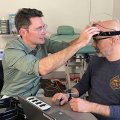A leading cognitive neuroscientist from UQ's Queensland Brain Institute and the Paul Bourke Lecture on Wednesday 30th June.
“Problems inhibiting behaviour are a major feature of a lot of psychiatric disorders. People with ADHD have trouble inhibiting behaviour – for example, children often blurt out answers in class at inappropriate times and just can’t exercise cognitive control,” Dr Bellgrove said.
The neuroscientist is leading one of the largest studies in Australia into ADHD in an effort to identify the genes that confer risk to the disorder. His team is hoping to recruit more than 600 families for their research.
Dr Bellgrove is also investigating the effects of certain chemicals, such as dopamine and noradrenaline, on the ability to inhibit behaviour.
“Drugs that are used to treat ADHD, such as Ritalin, have a mixed dopamine and noradrenaline action and this seems important to improving our ability to inhibit information," he said.
“This research also provides us with molecular targets for genetic analysis, so we can look for genetic variation in the noradrenaline transporter gene and see whether it predicts your ability to be able to inhibit your behaviour.”
Eventually, this research could assist researchers to better diagnose patients and provide more targeted treatments.
The free lecture is being held at the Queensland Brain Institute at 6pm and is open to the public. Please RSVP to assa.secretariat@anu.edu.au or phone (02) 6249 1788.
People wanting to find out more about the ADHD study should visit www.adhdstudy.com.au, call 0434 375 652 or email m.bellgrove@uq.edu.au
Media: Anna Bednarek (+61 7 3346 6414, a.bednarek@uq.edu.au)
.jpg)









